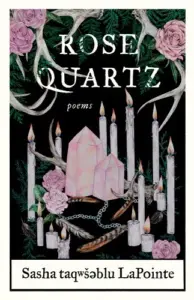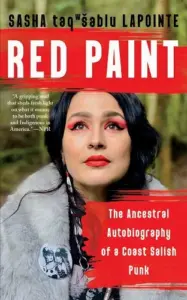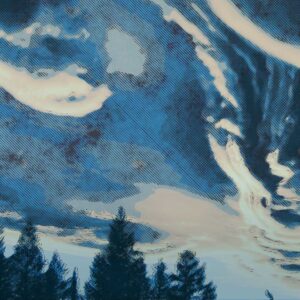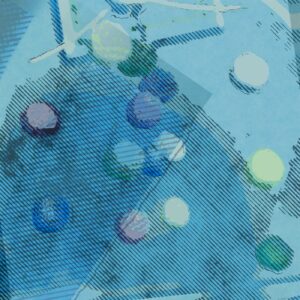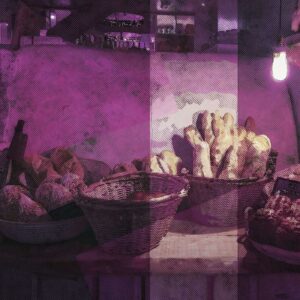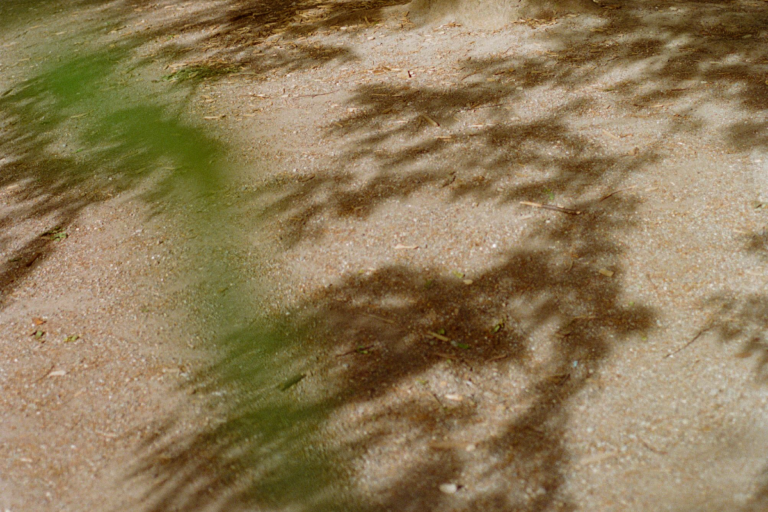Sasha taqwšəblu LaPointe
Blue
In a poem that explores a story of a name, a story of a color, a story of a sound, a story of an identity, a the story of a person — we hear of ancestors, childhood innocences, exclusions, memories, sensualities, and the way that the dead are not always dead.
We’re pleased to offer Sasha taqʷšəblu LaPointe’s poem, and invite you to connect with Poetry Unbound throughout this season. Accompany your listen with our bonus episode, “A Conversation with Sasha taqʷšəblu LaPointe.”
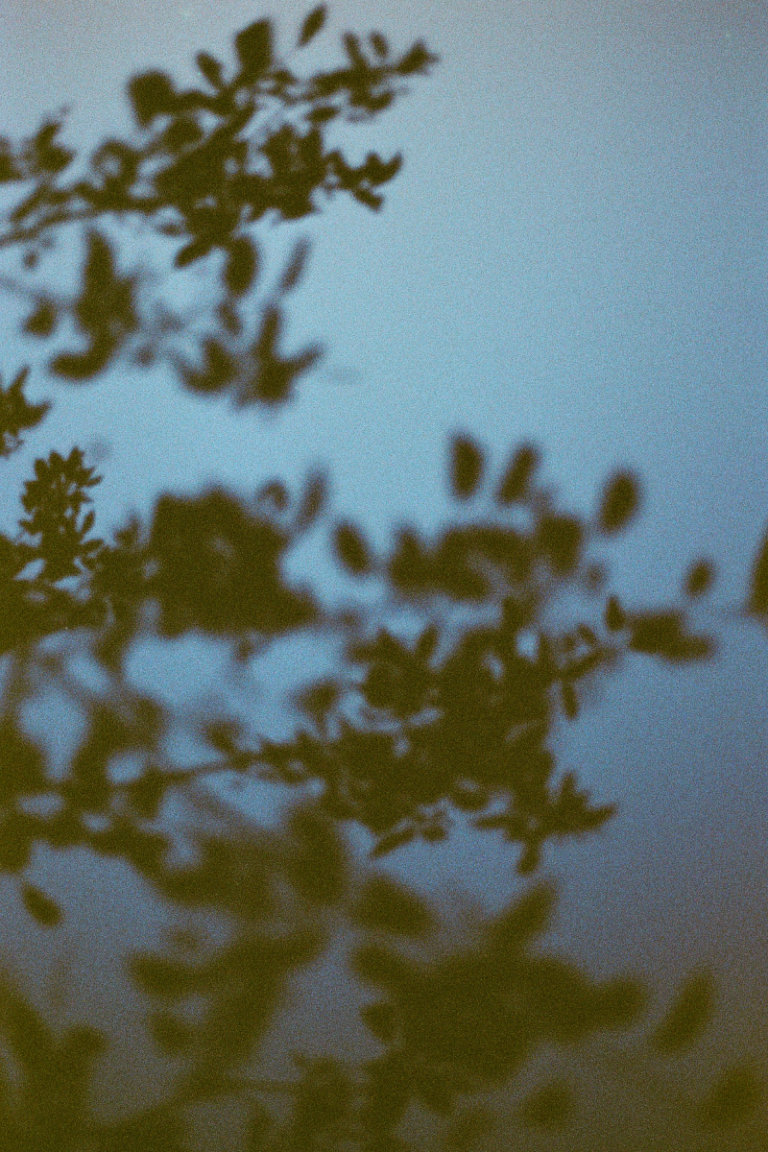
Image by Annisa Hale/ Film processed by Moody's Film Lab, © All Rights Reserved.
Guest
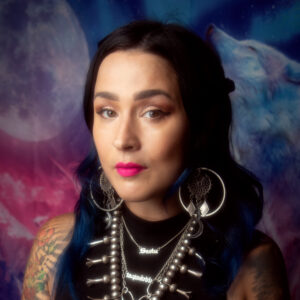
Sasha taqwšəblu LaPointe is the author of Rose Quartz. She is from the Upper Skagit and Nooksack Indian Tribes. Native to the Pacific Northwest, she draws inspiration from her coastal heritage as well as her life in the city. She is the author of the critically acclaimed memoir Red Paint, and holds a double MFA in creative nonfiction and poetry from the Institute of American Indian Arts. Her work has appeared in The Rumpus, Yellow Medicine Review, Hunger Mountain, and elsewhere. She lives in Tacoma, Washington.
Transcript
Transcription by Alletta Cooper
[music: “Praise the Rain” by Gautam Srikishan]
Pádraig Ó Tuama: When I was a teenager, I had a radio in my room and I could record songs off the radio onto a blank cassette tape, and it could also record speech. And one time I recorded myself saying, “My name is Pádraig Ó Tuama.” And I stopped it and rewound it and played it back. And I was shocked to think, “Is that what I sound like?” I didn’t like the sound of my own voice at all. I thought, “If this is what I sound like, why would anybody be friends with me?” There was a question of, “Who am I?” There was angst. There was a desire to fit in, a desire to know, “Who am I around other people?” And huge questions about the world that I was trying to condense into the sound of my own voice speaking back to me. So important, so limited, so expansive all held together in the experience of knowing my own name and trying to figure out what the sound of my own name was in my own voice.
“Blue” by Sasha taqʷšəblu LaPointe
“I emerge from our yellow linoleum bathroom blue
at one end of our single-wide trailer
and I have the length of narrow hallway to consider
before reaching the living room blue
Blue!? And I know my mother is furious
You look ridiculous it’s all she says
and I do I had torn the pages from a magazine
lined my bedroom floor with them and studied
those punk rock spiked hair white teeth
high fashion popped collar leather studded glossy photos
strewn across my small space like a spread of tarot cards
telling me a future I would never get to
not out here not in the white trailer rusting amber
thick of trees stretch of reservation of highway
that stood between me and whatever else was out there
record stores the mall parking lots where kids were skateboarding
and smoking pot probably kids with boom boxes and bottles of beer
out there were beaches with bands playing on them
and these faces these shining faces with pink green purple and blue hair
blue I could get that at least
I could mix seventeen packets of blue raspberry Kool-Aid
with a little water and I could get that
it was alchemy it was potion-making
but no one told me about the bleach
about my dark hair needing to lift
to lighten in order to get that blue
no one told me that the mess of Kool-Aid
would only run down my scalp my face my neck
would stain me blue
“Blue is what you taste like
he says still holding me on the twin bed
in the glow of dawn my teenage curiosity
has pushed me to ask What does my body taste like to you
his fingers travel from neck to navel
breath on my thigh and here in our sacred space
he answers simply Blue you taste blue
and I wonder if what he means is sad
you taste sad
“taqʷšəblu
the name is given to me
when I am three
to understand it
my child brain has to break it apart
taqʷšəblu
talk as in talking
as in to tell as in story
sha as in the second syllable
of my English name
as in half of me
blue as in the taste of me
blue as in sad
“my grandmother was taqʷšəblu
before me and now I am
taqʷšəblu too”
[music: “White Filament” by Blue Dot Sessions]
This is a poem that goes from place to place to place asking serious questions and holds them all together with the repetition of this word, “blue.” It’s in the title, and then 17 times throughout the poem you hear the word blue, whether or not it’s said as the color or implied to be referring to sad or as the final syllable in Sasha taqʷšəblu LaPointe’s Skagit name. Blue, taqʷšəblu.
And so the word itself — blue — holds the poem together. And sometimes in a poem that says the word so many times, you begin to see that word is something like a portal that’s opening itself up to all kinds of other things. Identity: Who am I? Who am I connected to? What’s the experience of me? Who can I be? Who do I want to be?
And this poem links blue with place as well. First of all, the bathroom where she’s dying her hair using Kool-Aid, blue raspberry Kool-Aid, 17 packets of it. And then the reservation, and then her own body as well. And then a sense of place with lover and that twin bed. And then finally we get into the place with your own name and particularly the place within your own family and the way that a name — like a namesake — can travel down through family. “My grandmother was taqʷšəblu / before me and now I am / taqʷšəblu too.”
The poem resolves itself into this sense of connection across generations rather than connection within generation. So time is occurring in the poem, place is occurring within the poem. What she’s feeling about herself and what she’s seeing about the world is located in the poem. And it’s all held together by this repeated sound: blue, blue, blue, blue, meaning so many things all at once.
[music: “Family Tree” by Gautam Srikishan]
Sasha taqʷšəblu LaPointe is a Coast Salish woman from the Pacific Northwest as it might be called. And this poem comes from a great new book called Rose Quartz. And throughout it, there are characters that repeat and there’s questions about identity, questions about location, questions about politics, questions about language. And in this particular poem, we get introduced to the grandmother, taqʷšəblu also, from whom she gets her name. And the name was given to her when she was three. She says that she had to “break it apart” to understand it, looking at it through three syllables: “talk as in talking,” “sha as in the second syllable / of my English name / as in half of me” and then “blue as in the taste of me.”
I had a conversation with Sasha taqʷšəblu LaPointe about this poem and we have a Poetry Unbound extra that’s also in the feed today. Her grandmother was a language revivalist and was so instrumental in preserving and writing down and continuing on a legacy of education within Lushootseed. And so the way within which language occurs in this poem and language of connection through name to this magnificent grandmother is a real testament to the book, to her own work, and her own life, and her artistic communication too.
[music: “A Little Powder” by Blue Dot Sessions]
There’s multiple aspects that happen in this poem. It moves through life in so many interesting ways. Starting initially with being a teenager and wanting to feel connected and feeling trapped at the same time. What you see in this poem is somebody who on the one hand feels separate from classmates and feels separate from other people, feeling separated by that highway. The “thick of trees stretch of reservation of highway / that stood between me and whatever else was out there.” And then at the same time, you see this young person who has all of these “glossy photos / strewn across my small space like a spread of tarot cards,” “punk rock spiked hair white teeth / high fashion popped color leather studded glossy photos.”
On the one hand, wanting to be different and on the other hand, wanting to fit in. “blue I could get that at least.” So in this way, blue is a key, some way to fit into a culture that’s different from perhaps a culture that she’s experiencing elsewhere. Some desire to fit in with a particular community of people.
Throughout the poem, there’s indications of calling out what it is that is failing when it comes to being indigenous in your own country and yet being treated like a second-class citizen. “White teeth,” “white trailer,” “bleach / about my dark hair needing to lift / to lighten.” These too are things that are between her and the world.
Then as the poem moves to the body, there’s this intimate connection as a teenager in that twin bed. One of the things I think is so interesting in this is that you hear this beautiful question. “What does my body taste like to you?” And to ask that question means you need to trust yourself, but also trust the one you’re asking it of. And that question is taken seriously and given an extraordinary answer back: “Blue you taste blue.” Perhaps an obscure or oblique response. And she says she wonders “if what he means is sad / you taste sad.”
And “sad” here just exists along all the other kinds of things. There’s the possibility of being alternative, of fitting into crowds, of being connected with the grandmother, of being connected with culture, of being distant and different and embodied in yourself, all of these multiple energies. And “sad” is just there amidst the multiple energies, and linked then deeply with the color of blue. But it’s all accepted and held. This is a name and a story and a poem that makes space for sad, isn’t overwhelmed by it but tells the truth of it, too.
[music: “True Shape” by Blue Dot Sessions]
The question of “Who am I” is an enlivening question for life, for literature, for all art, and for what it means to be a friend as well, what it means to be connected. And sometimes I suppose the idea that “Who am I?” needs to be answered in a singular answer, is going to limit the possibilities of living into the answers that that question can evoke. And one of the things that’s so wise about this poem is that it’s saying “Who am I?” is plural: I am the one who wants to fit in. I am the one who wants to distinguish myself. I am the one who’s different. I am the one who’s connected. I am the one who’s linked with my grandmother, and I am the one who feels alone. I am the one on the reservation. I am the one who might want to leave the reservation, but I am the one also who’s proud to be a Coast Salish woman, who will speak my Skagit name. And in all of this, the answer to “Who am I?” is coming across with such pluralities. And it is inviting others around too, to say, “In the midst of me being who I am, what does it mean to be that in community with others who are asking that of themselves?” So I see that the question of “Who am I?” is being put forward in this poem as a communal invitation, too, to think, “In the midst of me wondering, who am I? How can I make space, and how can I recognize the space making and the place making necessary for others too, to be safe enough and provided for enough, and acknowledged and given justice enough to ask that question in safety, too?”
[music: “Ashed to Air” by Gautam Srikishan]
“Blue” by Sasha taqʷšəblu LaPointe
“I emerge from our yellow linoleum bathroom blue
at one end of our single-wide trailer
and I have the length of narrow hallway to consider
before reaching the living room blue
Blue!? And I know my mother is furious
You look ridiculous it’s all she says
and I do I had torn the pages from a magazine
lined my bedroom floor with them and studied
those punk rock spiked hair white teeth
high fashion popped collar leather studded glossy photos
strewn across my small space like a spread of tarot cards
telling me a future I would never get to
not out here not in the white trailer rusting amber
thick of trees stretch of reservation of highway
that stood between me and whatever else was out there
record stores the mall parking lots where kids were skateboarding
and smoking pot probably kids with boom boxes and bottles of beer
out there were beaches with bands playing on them
and these faces these shining faces with pink green purple and blue hair
blue I could get that at least
I could mix seventeen packets of blue raspberry Kool-Aid
with a little water and I could get that
it was alchemy it was potion-making
but no one told me about the bleach
about my dark hair needing to lift
to lighten in order to get that blue
no one told me that the mess of Kool-Aid
would only run down my scalp my face my neck
would stain me blue
“Blue is what you taste like
he says still holding me on the twin bed
in the glow of dawn my teenage curiosity
has pushed me to ask What does my body taste like to you
his fingers travel from neck to navel
breath on my thigh and here in our sacred space
he answers simply Blue you taste blue
and I wonder if what he means is sad
you taste sad
“taqʷšəblu
the name is given to me
when I am three
to understand it
my child brain has to break it apart
taqʷšəblu
talk as in talking
as in to tell as in story
sha as in the second syllable
of my English name
as in half of me
blue as in the taste of me
blue as in sad
“my grandmother was taqʷšəblu
before me and now I am
taqʷšəblu too”
[music: “Praise the Rain” by Gautam Srikishan]
Chris Heagle: “Blue” comes from Sasha taqʷšəblu LaPointe’s book Rose Quartz. Thank you to Milkweed Editions who gave us permission to use Sasha’s poem. Read it on our website at onbeing.org.
[music: “Praise the Rain” by Gautam Srikishan]
Poetry Unbound is: Gautam Srikishan, Eddie Gonzalez, Lilian Vo, Lucas Johnson, Amy Chatelaine, Kayla Edwards, Annisa Hale, and me, Chris Heagle.
Our music is composed and provided by Gautam Srikishan and Blue Dot Sessions.
This podcast is produced by On Being Studios, which is located on Dakota land. Open your world to poetry with us by subscribing to our Substack newsletter. You may also enjoy Pádraig’s new book, Poetry Unbound: 50 Poems to Open Your World. For links and to find out more visit poetryunbound.org.
Books & Music
Recommended Reading
The On Being Project is an affiliate partner of Bookshop.org and Amazon.com. Any earnings we receive through these affiliate partnerships go into directly supporting The On Being Project.





